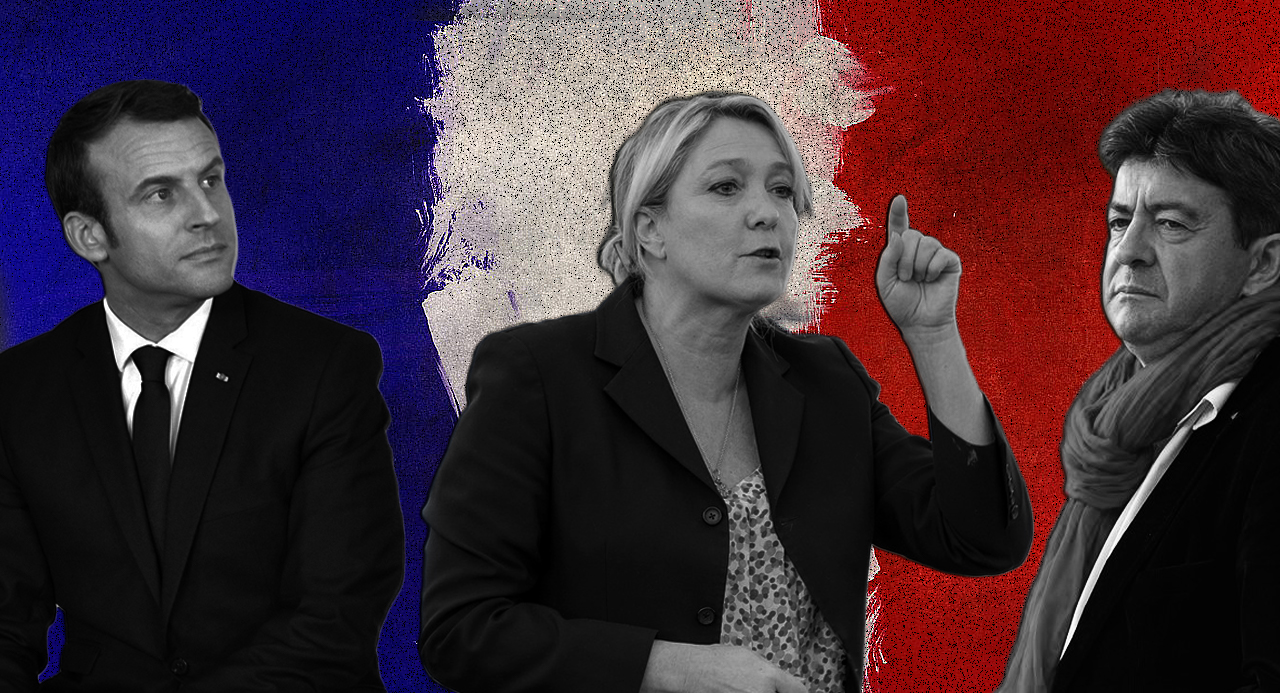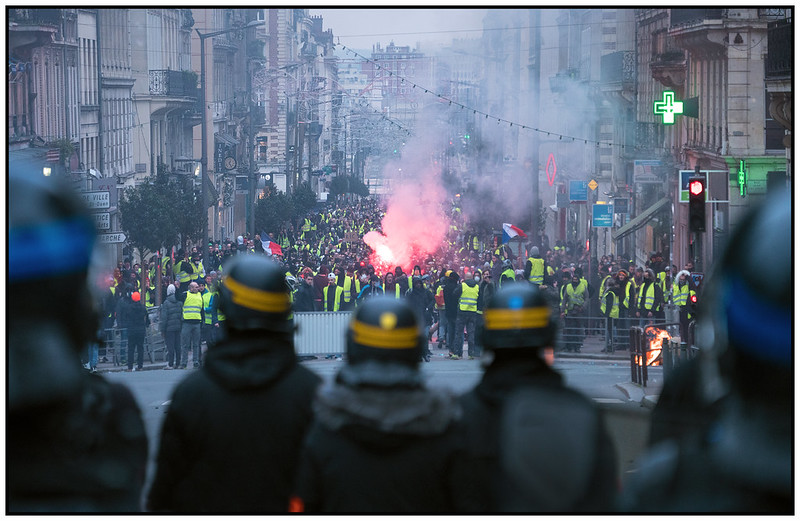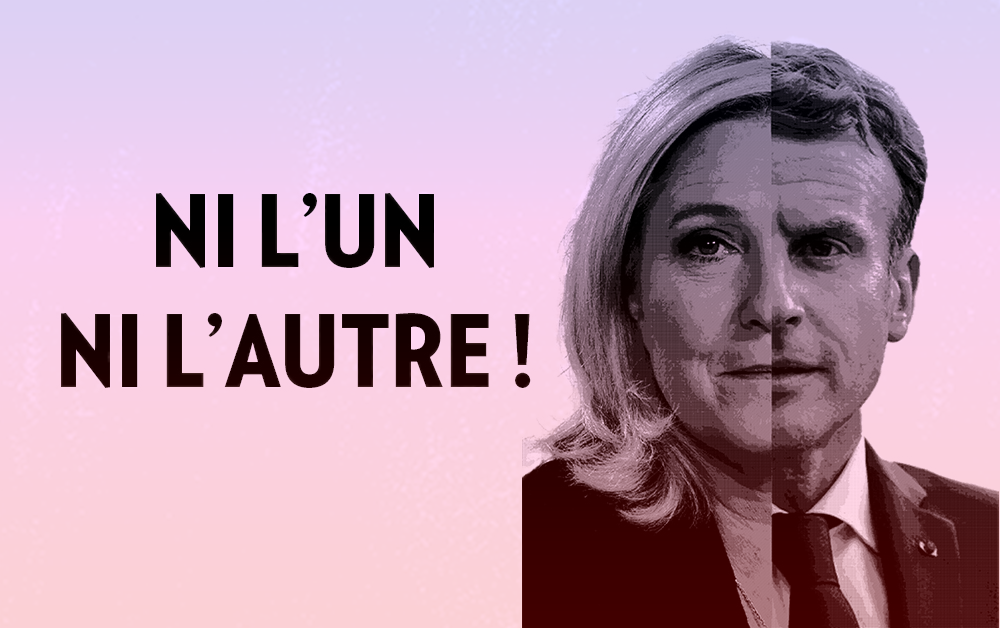
The first round of the French presidential elections represented a watershed moment in the political situation. Above all, we saw a tremendous rejection of the establishment. The traditional parties were decimated, and so-called ‘extremist’ candidates received over 50 percent of the vote. Left-winger Jean-Luc Mélenchon was denied a place in the final round by barely one percentage point, thanks largely to the wrecking behaviour of other left parties. The ‘centrist’ incumbent Emmanuel Macron now faces a knife-edge race in round two against Marine Le Pen of National Rally (RN).
Abstention was very high, at over 26 percent, suggesting that millions of French citizens are ras le bol – sick to the back teeth with all of the political parties, who in their eyes are equally incapable of improving their lives. French society is heavily polarized, the status quo is totally discredited, and no matter who ultimately wins the presidency, the stage is set for almighty eruptions that will reverberate throughout the whole of Europe.
Pollsters initially expected a comfortable victory for Macron, who like other western leaders sees the war in Ukraine as an opportunity to whip up national patriotic hysteria. This move initially saw him leap to 30 percent in the polls, against 18 percent for Le Pen and 12 percent for Mélenchon. Having championed a diplomatic approach to Putin up until the invasion (mindful of France’s reliance on Russian gas and oil), Macron closed ranks with the rest of the European bourgeoisie in trumpeting his commitment to NATO, as well as sanctions on Russia and “lethal aid” (i.e. sending weapons) to assist the Ukrainian war effort. He even started imitating Ukrainian President Zelensky’s wardrobe, exchanging his tailored suit for a green hoodie and stubble, in a pathetic attempt to benefit from some reflected glory.
But the temporary boost soon waned. As the weeks drew on, Macron’s lead was rapidly eroded, with the final result putting him and his party, La République En Marche (REM), on 28 percent against 23 percent for Le Pen. This is a slightly higher result for Macron than in the first round of 2017, and yet the president’s reaction to the polls bore a note of panic. Having won 66-34 against Le Pen in 2017, the polls now put him on 52-48 in the second round. It is clear that Macron, who was once hailed by every establishment mouthpiece as the ‘hero of the sensible centre’, is now despised by a wide swathe of the French masses. And for good reason.
Macron versus ‘fascism’?
Macron’s presidency has seen unrelenting attacks on the working class, including a sweeping privatization program targeting everything from airports and railways to state energy companies; mass sackings in the public sector; counter-reforms to pensions; intensified state repression; and demagogic persecution of migrants and minorities. This offensive against French workers provoked massive opposition, from the gilets jaunes protests of 2018-19, which reached near-insurrectionary proportions; to a huge strike wave in 2019; and youth-led protests against increased police surveillance and hijab bans in 2020 and 2021.
These struggles were all met with savage repression by state forces. Dozens of gilets jaunes were maimed by the police, with many losing fingers and eyeballs to stingball grenades and other delightful ‘riot control’ devices. The courts were turned into a conveyor belt that delivered protestors directly to prison with barely a nod to due process. During the 2019 strike, firefighters were forced to become a praetorian guard to protect striking workers from attacks by the gendarmes. And countless videos exist online of officers firing gas canisters at protestors at close range, attacking high school children, and beating unarmed citizens.

Such brutality contrasts sharply with Macron’s hypocritical homilies about ‘defending democracy’ in Ukraine. Meanwhile, he earned the deserved moniker ‘President of the Rich’ with policies such as cutting France’s wealth tax and liberalizing the country’s labour laws. Moreover, his utter lack of authority with the masses led to a huge amount of distrust, reflected for example in the sluggish uptake of the COVID-19 vaccine, which contributed to one of the highest death rates from the virus in all of Western Europe, roughly on par with Britain when adjusted for population.
In short, the shine has well and truly come off this favoured son of the European ruling class. The French masses have had a taste of Macron’s ‘sensible centre ground’, and are unenthusiastic about the prospect of more. In a recent interview, a 63-year-old nursery teacher in the Paris region – who will have to wait longer for retirement, and must work extra hours thanks to Macron’s attacks on terms and conditions for municipal employees – put the matter succinctly: “it can’t get any worse.” She added she would vote for anyone but Macron in the second round. As The Economist correctly summarizes: “Five years of government by the world’s centrist standard-bearer has eroded support for the centre.”
The bourgeois press are now raising a hue and cry about the threat of a ‘fascist’ president in the second country of Europe. Such hysteria can be dismissed out of hand. Marine Le Pen is certainly a reactionary brute, but she is no fascist. In actual fact, she is a demagogue who has modelled her campaign on that of Donald Trump in the United States. She has gained ground particularly in working-class departments in the north, and former industrial heartlands of la France profonde (“deep France”) that were decimated by deindustrialization. With the present cost of living crisis putting even more pressure on poor workers and middle-class layers, Le Pen’s pledges to cut taxes on fuel and other necessities, and incentivize businesses to raise wages, have struck a chord.
She has also toned down the more incendiary racist and anti-immigrant rhetoric that defined Front National in the past, although she still seeks to amend France’s constitution to abolish the right to citizenship for children with foreign parents; to give priority to French nationals for jobs and social housing; to make it harder for refugees to seek asylum; and to ban the Muslim headscarf in all public places. But then again, Macron has also leaned into national chauvinism in an attempt to cut across RN’s support, so there’s little difference between the candidates on these issues! And while Le Pen has backed away from leaving the Eurozone, she continues to call for France to “reclaim its sovereignty” from the EU, exploiting an anti-establishment sentiment directed against Brussels.
Far from a shift to the right or towards fascism, Le Pen’s growing popularity at Macron’s expense represents a growing resentment by working-class and middle-class layers towards the status quo. It expresses class anger towards a hated and out-of-touch elite, albeit in a distorted way. A 69-year-old former miner from Stiring-Wendel, a small town in eastern France, was quoted in the Wall Street Journal as saying that, until recently, he never really imagined Le Pen could become president. “She was too scary… she represented the far right, and she wanted to leave Europe. Now, I can see her as president. She is more serious, more focused on our struggle.” Even a section of former Communist Party of France (PCF) voters are transferring their support to Le Pen. This is also a direct expression of the right-wing drift off the party itself.
Traditional parties decimated, Mélenchon exceeds expectations
Aside from falling support for Macron, fury with the establishment can also be seen in the pitiful showing for the Socialist Party (PS) and The Republicans (LR). France’s traditional centre-left and centre-right parties, which once dominated the postwar electoral landscape, have been reduced to rumps. With just 4.8 percent of the vote, Valérie Pécresse of LR was forced to make a humiliating appeal to supporters for “urgent help” to “cover the remaining costs” of the campaign, calling for donations via her personal website! She spoke of the “critical situation” facing LR after losing €7 million, implying the party might be on the brink of bankruptcy. To borrow a French expression: quel dommage! But none suffered greater humiliation than PS, whose candidate Anne Hidalgo, Mayor of Paris, scraped together just 1.7 percent of the vote. This astonishing result is just desserts for the betrayals of the François Hollande government, from which the party has never recovered. After these presidential elections, there is a potential that it never will.
Elsewhere, the Green candidate Yannick Jadot picked up a miserly 4.7 percent of the vote, and was quick to endorse Macron for the second round, along with Hidalgo and Pécresse. Éric Zemmour, who attempted to stake a claim to Le Pen’s right on a hardline racist and nationalist platform, came fourth on 7 percent and threw in behind RN. Had one been listening to international coverage of the elections, this two-horse contest between the ‘centre and far-right’ might have seemed like the whole story. The BBC only spoke vaguely of an increasing “polarization between the far-right and the far-left”, without naming any “far-left” candidates. The Paris correspondent stated only that you would “need to go down to 2.5 percent to find the nearest socialist candidate.” In fact, another candidate made a surprising late surge, barely missing out on the second round.

Mélenchon’s programme L’Avenir en commun (‘A Shared Future’) was neither socialist nor ‘extreme left’, as some commentators had suggested. But it was more radical than anything proposed by the other left candidates, and contained a number of important reforms to pay, pensions, employment and public services, as well as proposals to tackle climate change. During the campaign, Mélenchon and his party France Insoumise (FI) were identified as the only credible alternative on the left and steadily gained momentum before accelerating in the final days of the race. Despite predictions from the bourgeois press that Mélenchon’s ‘soft’ stance on Russia and opposition to NATO would harm his chances after Putin’s invasion of Ukraine, support for FI rapidly climbed from 10 percent in February to over 20 percent.
In the end, Mélenchon gathered 22 percent of the vote, with 7.7 million votes cast to Le Pen’s 8.1 million. FI improved on its result in 2017, where it gained 19 percent of the vote in the first round, and it performed especially well in Toulouse and Lyon, which not coincidentally saw major protests by the gilets jaunes, and which host large student populations. It also polled strongly in Marseille (which Mélenchon represents in the National Assembly), Lilles, and France’s overseas territories. Mélenchon did especially well amongst young people, with 34 percent of the vote among 18-24 year-olds, compared to 25 percent for Macron and 17 percent for Le Pen. This strong youth vote is an important factor in the situation, and shows the most progressive and dynamic layers of French society are increasingly turning their backs on capitalism and searching for an alternative on the left, a phenomenon observed all over the world.
These figures put paid to the drivel emanating from the bourgeois analysis, reformists and sectarian empirics alike, that left-wing politics is ‘dead’ in France. On the contrary, it is the traditional mass parties of the left that have squandered all their support and authority following decades of betrayal and class collaboration.
The press is filled with pronouncements that French politics are polarizing between the “extreme right and the extreme left”. French society is indeed heavily polarized, but what this amounts to is a resounding rejection of the establishment and the so-called centre ground. In reality, the high support for Mélenchon and Le Pen represents this same process. It is no accident that about a third of Mélenchon’s first round vote went to Le Pen in 2017, with another third going to Macron and the remaining third abstaining. This time, 30 percent of FI voters in round one say they will vote for Le Pen, and this number could go up.
The French masses are hunting for a way out and abandoning the status quo in disgust. Part of the reason this polarization appears to express itself more on the right is down to Mélenchon himself, who made the serious error of moderating his program after 2017. But the wrecking, sectarian behaviour of small parties on the left is another factor.
The PCF bears particular shame in these elections by choosing to stand a candidate (Fabien Roussel) against Mélenchon, rather than stepping aside as in 2017. The PCF received 2.3 percent in the first round, which while derisory, might nevertheless have been enough to tip the balance in Mélenchon’s favour, blocking Le Pen and turning the second round into a clear-cut contest between the right and left. This would have electrified the situation, and doubtlessly drawn in a big section of non-voters behind FI, as they would have been presented with a genuine alternative. The same is true of tiny parties like the NPA and Lutte Ouvrière (LO), who despite getting less than one percent each could have changed the character of these elections entirely by pulling out of the race.
In the end, these parties have accomplished nothing other than to guarantee a right-wing president, lose their campaign expenses, and secure their continued irrelevance. Roussel has even joined the PS and LR in endorsing Macron in the second round. These characters had the gall to justify running in the election on ‘pragmatic’ grounds, arguing that Mélenchon couldn’t win anyway. And now, after helping ensure Mélenchon did not win, we witness the sorry spectacle of a so-called Communist ‘pragmatically’ endorsing a banker!
Reject lesser-evilism!
Predictably, a mountain of pressure has fallen on Mélenchon and FI to support Macron in the second round in order to defeat “the fascist”. This chorus of lesser-evilism evokes a strong sense of déjà vu: we heard the exact same thing after the first round in 2017. And just like in 2017, the so-called ‘left-wing’ journalists and intellectuals were the first to encourage ‘reluctant’ support for Macron. In Britain, the self-described ‘Marxist’ pundit Paul Mason (who in fact has crossed fully to the side of chauvinism and reaction over Ukraine) tweeted as soon as the exit polls came out that Mélenchon “must urge an anti-fascist vote”, no matter how “distasteful” it might be.
Unfortunately, Mélenchon himself has wavered under this pressure. Although he stopped short of outright endorsing Macron, he stated in his concession speech: “[We have] to choose between two evils that are terrible for us and that aren’t of the same nature. Every one of you will face his conscience. We must not give a single vote to Marine Le Pen.”

But FI voters will be even less willing to hold their noses compared to five years ago. After all, they know from experience what a Macron presidency means: vicious attacks on the working class. In a Financial Times article, a sports teacher in Aubervilliers, a poor area on the outskirts of Paris, was quoted saying: “I voted for Macron five years ago [after backing FI in the first round], and for five years I bitterly regretted it. No way I’ll vote for Marine Le Pen but will Macron just make things worse for poorer families? I don’t know what I’ll do.”
By dangling the threat of ‘fascism’ and painting Macron as the ‘lesser evil’, the bourgeois, liberals and reformists alike hope to intimidate workers and youth into lining up behind the ‘respectable’ right-wing candidate. We completely reject this wretched demagogy. Le Pen is not a fascist, she is a right-wing bourgeois, and fundamentally no different from Macron. Both represent the hated capitalist system, and neither would advance the interests of the French working class a single jot. We say: no class collaboration, neither one nor the other in the second round! FI’s supporters must keep their banner clean and regroup in preparation for the decisive battles to come.
These election results have set nerves jangling in every European government. The bourgeoisie were already spooked by Victor Orban’s victory in Hungary, but now they face the prospect of Europe’s second country being led by an untested, anti-EU president who has previously expressed a desire to exit NATO. The ruling classes in the West are panicking at the idea of a Le Pen presidency causing even more disintegration of their united front against Russia. This is already being tested by their differing reliance on Russian gas and oil, meaning some would prefer to seek an earlier settlement with Putin, at the cost of greater concessions by Ukraine, while others (particularly Britain and the US) want Ukraine to fight to the bitter end.
It is more than likely that a smaller proportion of Mélenchon’s supporters will vote for Macron compared to 2017, and Le Pen is also expected to fare better among non-voters from round one. There is a real chance she could win. This would of course mark a shift in the situation, and cause even more contradictions to build up in European politics. But ultimately, no matter who wins, the French workers and youth will have a fight on their hands against a reactionary administration that will attempt to foist the consequences of the capitalist crisis on their shoulders. The struggles of the future will leave everything that came before in the shade.

